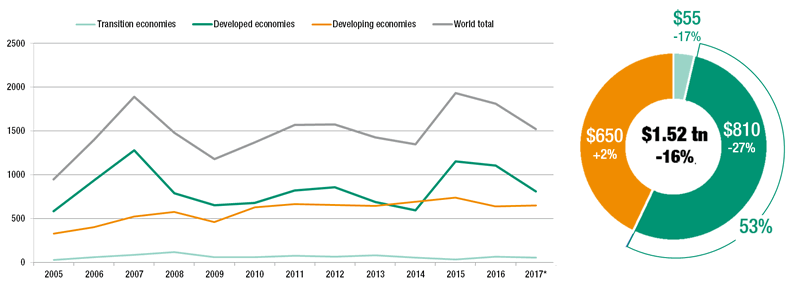UNCTAD released its latest Investment Trend Monitor. The results are surprising in view of other positive economic indicators. The key information is that Global Foreign Direct Investment slipped further in 2017.

(Billions of US dollars)
UNCTAD Secretary-General, Mukhisa Kituyi, insisted that more investment in sectors that could contribute to the Sustainable Development Goals (SDGs) remained badly needed.
- Global foreign direct investment (FDI) fell by 16% in 2017, to an estimated US$1.52 trillion, from a revised US$1.81 trillion in 2016 – a stark contrast to other macroeconomic variables, such as GDP and trade growth, which saw substantial improvements in 2017.
- A slump in FDI flows to developed countries (-27%) was the principal factor behind the global decline. A strong decrease in flows was reported in Europe (-27%) as well as in North America (-33%), mainly due to a return to prior levels of inflows in the United Kingdom and the United States after spikes in 2016. This decline was tempered by an 11% growth in flows to other developed economies, principally Australia.
- FDI to developing economies remained stable, at an estimated US$653 billion, 2% more than the previous year. Flows rose marginally in developing Asia and Latin America and the Caribbean, and remained flat in Africa. Developing Asia regained its position as the largest FDI recipient region in the world, followed by the European Union and North America.
In the last 15 years, developing countries have been affected by two major trends: an upsurge in foreign direct investment (FDI), and their increasing participation in the process of production fragmentation. The new wave of FDI has swept sub-Saharan African (SSA) countries, where inflows are becoming more diversified, both geographically (thanks to emerging economies) and sectorally, shifting from exclusive concentration on extractive sectors to light manufacturing and services (Gorg et al. 2013, Sutton 2016). And through their participation in global value chains (GVCs), firms in developing countries have become fully qualified participants in the global market, specialising in specific stages of the production process, and exploiting their comparative advantages without having to develop all the capabilities needed along the whole chain (Baldwin 2014, Taglioni and Winkler 2016, World Bank 2017).
- FDI to the transition economies declined by 17% to an estimated US$55 billion, mainly due to a drop in the Russian Federation and lacklustre inflows across most of the Commonwealth of Independent States (CIS).
- After three years of growth, cross-border merger and acquisitions (M&As) declined in 2017. Their growth already slowed in 2016; in 2017, they contracted by 23%, to US$666 billion. However, this still represented the third highest level since 2007.
- Preliminary data on the value of announced greenfield FDI projects show a decline of 32% to US$571 billion (-17% in number of projects), their lowest level since 2003. If confirmed, the drop in greenfield project announcements would be a negative indicator for the longer term. Of particular concern is the near halving of the value of project announcements in developing economies, although the fall in project numbers was limited to 23%.
- Higher economic growth projections, trade volumes and commodity prices would normally point to a potential increase in global FDI in 2018. However, elevated geopolitical risks and policy uncertainty could have an impact on the scale and contours of any FDI recovery in 2018. In addition, tax reforms in the United States are likely to significantly affect investment decisions by United States MNEs, with consequences for global investment patterns.
Posed to become one of the fatsest growing economy,Prime Minister Narendra Modi – during his recent keynote address at the WEF 2018 – delivered a strong message to the world by calling for unity against protectionism and invited global companies to invest in India. He said due to the structural reforms carried out by the current government, India has opened a « new door of the FDI ». He assured the CEOs and the leaders of world powers that India was ready to take on any challenges like protectionism and terrorism.